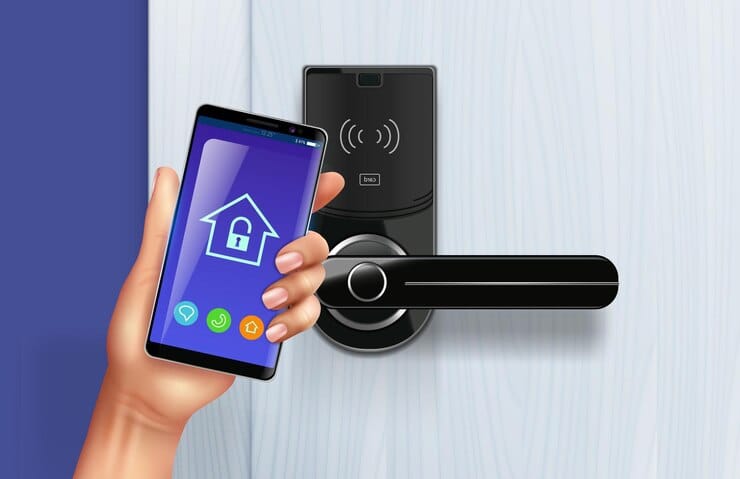Securing your properties is a deeply personal journey which evokes emotions of safety and peace. As you explore the options, the best digital locks offer convenience with their modern technology, while traditional locks provide a sense of timeless reliability. Each choice carries its weight, promising protection for what matters most.
Read this blog post to learn about shopping for the best locks and navigating the practicalities to find the perfect shield for your residential or commercial properties.
Digital Locks: Pros and Cons
The best digital locks offer a modern and convenient access control solution with their advanced technology, such as Bluetooth, Wi-Fi, or keypads. They eliminate the need for physical keys, allowing keyless entry via codes, fingerprints, or smartphone apps. This not only enhances security with encryption technology and makes hacking attempts challenging but also provides versatility with multiple access codes and temporary access options.
The ability to remotely control them via smartphones or computers ensures accessibility from anywhere, making them ideal for immediate access needs or unexpected visitors.
Pros:
● Advanced Technology: Digital locks, with their state-of-the-art features like Bluetooth, Wi-Fi, or keypads, offer contemporary access control solutions perfect for the digital age. These advanced technologies seamlessly integrate with modern lifestyles, providing convenient and secure property access and a reassuringly easy transition from traditional locks.
● Keyless Entry: Digital locks, with access through codes, fingerprints, or smartphone apps, eliminate the inconvenience and security risks associated with traditional keys. This keyless entry system enhances security and provides a welcome relief from the hassle of physical keys, allowing authorised individuals to enter quickly.
● Enhanced Security: Digital locks employ encryption technology, making hacking more difficult. This advanced security measure enhances overall security levels, instilling peace of mind for property owners by safeguarding against unauthorised access and potential security breaches.
● Remote Access: The convenience of remotely controlling locks via smartphones or computers ensures accessibility from anywhere. This feature is ideal for scenarios where immediate access is required or unexpected visitors need entry, providing property owners with enhanced flexibility and control over access to their properties.
Cons:
● Higher Initial Cost: Adopting digital locks entails a higher upfront investment than traditional locks, coupled with potential professional installation costs, which might deter budget-conscious property owners.
● Compatibility Issues: Installation of digital locks may require modifications, especially for older doors, potentially adding complexity and additional expenses to the overall setup process.
● Difficulty for Technologically Challenged Users: Digital locks may present usability challenges for individuals unfamiliar with technology or have difficulty operating electronic devices, potentially leading to frustration or reliance on assistance for essential lock functions.
● Limited Durability in Extreme Conditions: Digital locks may experience reduced durability in extreme environmental conditions, such as extreme cold or humidity. While modern designs aim to mitigate these issues, prolonged exposure to such conditions may impact the lock’s performance over time, requiring additional maintenance or replacement.
Traditional Locks: Pros and Cons
Traditional locks, on the other hand, offer a cost-effective security solution. They are renowned for their durability, ensuring reliable security over extended periods. They operate independently of power sources, guaranteeing uninterrupted functionality even during power outages. This reliability makes them a trusted choice for many homeowners and business owners.
Pros:
● Affordability: Traditional locks present a budget-friendly security solution, free from additional equipment or installation fees, making them accessible to property owners with diverse budget constraints. This affordability provides relief, ensuring that individuals with varying financial capabilities can secure their properties effectively without compromising security.
● Durability: Renowned for their sturdy build, traditional locks offer longevity and require minimal maintenance. Their robust construction ensures reliable security over extended periods, providing property owners with a sense of security and peace of mind, knowing that their locks will withstand the test of time and remain effective in protecting their properties.
● Accessibility: Traditional locks are widely available and replaceable, operating independently of power sources. This accessibility empowers property owners, as they can quickly obtain and install locks without facing challenges related to availability or compatibility. Even during power outages, ensuring continuous security for the property.
● Time-Tested Security: Traditional locks have a proven track record of providing security over many years. Their design and mechanisms have been refined and tested over time, earning the trust of property owners worldwide. This time-tested security aspect offers reassurance to homeowners and business owners, knowing they rely on a tried-and-true method of securing their properties.
Cons:
● Vulnerability to Picking: Traditional locks are susceptible to picking and bumping, and they lack the encryption technology of digital locks, which may compromise security in high-risk environments.
● Lack of Remote Access: The absence of remote access features in traditional locks limits convenience, requiring physical presence for locking or unlocking, which may be inconvenient or impractical in certain situations.
● Absence of Notifications: Traditional locks do not offer notification capabilities, making it challenging for property owners to monitor access remotely, potentially leading to security blind spots.
● Limited Key Control: Traditional locks often come with a limited number of keys, which can pose challenges in managing access control, especially in scenarios where multiple individuals require access to the property. This limitation may result in the need for duplicate keys, increasing the risk of unauthorised key duplication and compromising overall security.
Conclusion
Both digital locks and traditional locks, including shop shutter locks, present unique advantages and disadvantages, catering to different security needs and preferences. While digital locks offer advanced technology and remote access convenience, traditional locks, such as shop shutter locks, provide affordability and durability. Property owners should carefully weigh these factors and prioritise security and convenience based on their specific requirements to ensure optimal protection for their property.

